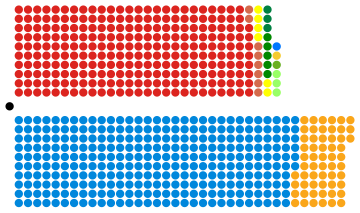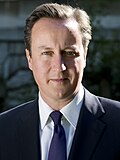| |||||||||||||||||||||||||||||||||||||||||||||||||||||
All 650 seats in the House of Commons 326[n 1] seats needed for a majority | |||||||||||||||||||||||||||||||||||||||||||||||||||||
|---|---|---|---|---|---|---|---|---|---|---|---|---|---|---|---|---|---|---|---|---|---|---|---|---|---|---|---|---|---|---|---|---|---|---|---|---|---|---|---|---|---|---|---|---|---|---|---|---|---|---|---|---|---|
| Opinion polls | |||||||||||||||||||||||||||||||||||||||||||||||||||||
| Registered | 45,597,461 | ||||||||||||||||||||||||||||||||||||||||||||||||||||
| Turnout | 29,687,604 65.1% ( | ||||||||||||||||||||||||||||||||||||||||||||||||||||
| |||||||||||||||||||||||||||||||||||||||||||||||||||||
 Colours denote the winning party, as shown in the main table of results
| |||||||||||||||||||||||||||||||||||||||||||||||||||||
 Composition of the House of Commons after the election | |||||||||||||||||||||||||||||||||||||||||||||||||||||
| |||||||||||||||||||||||||||||||||||||||||||||||||||||
The 2010 United Kingdom general election was held on Thursday 6 May 2010, to elect Members of Parliament (or MPs) to the House of Commons. The election took place in 650 constituencies[note 2] across the United Kingdom under the first-past-the-post system. The election resulted in a large swing to the opposition Conservative Party led by David Cameron similar to that seen in 1979, the last time a Conservative opposition had ousted a Labour government. The governing Labour Party led by the prime minister Gordon Brown lost the 66-seat majority it had previously enjoyed, but no party achieved the 326 seats needed for a majority. The Conservatives won the most votes and seats, but still fell 20 seats short. This resulted in a hung parliament where no party was able to command a majority in the House of Commons. This was only the second general election since the Second World War to return a hung parliament, the first being the February 1974 election. This election marked the start of Conservative government for the next 14 years.
For the leaders of all three major political parties, this was their first general election contest as party leader, something that had last been the case in the 1979 election. Prime Minister Gordon Brown had taken office in June 2007 following the end of Tony Blair's 10-year tenure as prime minister and 13 years as leader of the Labour Party, while David Cameron had succeeded Michael Howard in December 2005 and Nick Clegg had succeeded Menzies Campbell (who never contested a general election) in December 2007.
During the campaign, the three main party leaders engaged in the first televised debates. The Liberal Democrats achieved a breakthrough in opinion polls following the first debate, in which their leader Nick Clegg was widely seen as the strongest performer. Nonetheless, on polling day their share of the vote increased by only 1%, with a net loss of five seats. This was still the Liberal Democrats' largest popular vote since the party's creation in 1988; they found themselves in a pivotal role in the formation of the new government. The share of votes for parties other than Labour or the Conservatives was 35%, the largest since the 1918 general election. In terms of votes it was the most "three-cornered" election since 1923, as well as in terms of seats since 1929. The Green Party of England and Wales won its first ever seat in the House of Commons, and the Alliance Party of Northern Ireland also gained its first elected member.[2] The general election saw a 5.1% national swing from Labour to the Conservatives, the third-largest since 1945. The result in one constituency, Oldham East and Saddleworth, was subsequently declared void on petition because of illegal practices during the campaign, the first such instance since 1910.
A hung parliament had been largely anticipated by the opinion polls in the run-up to the election, so politicians and voters were better prepared for the constitutional process that would follow such a result than they had been in 1974.[3] The coalition government that was subsequently formed was the first to result directly from a UK election. The hung parliament came about in spite of the Conservatives managing both a higher vote total and a higher share of the vote than the previous Labour government had done in 2005, when it had secured a comfortable majority (although vastly reduced from its landslide victories at the previous two elections). Coalition talks began immediately between the Conservatives and the Liberal Democrats, and lasted for five days. There was an aborted attempt to put together a Labour/Liberal Democrat coalition (although 11 seats from other smaller parties would have been required). To facilitate this, Gordon Brown announced on the evening of Monday 10 May that he would resign as Leader of the Labour Party. Realising that a deal between the Conservatives and the Liberal Democrats was imminent, Brown resigned the next day, on Tuesday 11 May, as prime minister, marking the end of 13 years of Labour government.[4] This was accepted by Queen Elizabeth II, who then invited David Cameron to form a government in her name and become prime minister. Just after midnight on 12 May, the Liberal Democrats approved the agreement "overwhelmingly",[5][6] sealing a coalition government of Conservatives and Liberal Democrats.
A total of 149 sitting MPs stood down at the election, the highest since 1945, including many former New Labour Cabinet ministers such as former Deputy Prime Minister John Prescott, Alan Milburn, Geoff Hoon, Ruth Kelly, James Purnell and John Reid. One reason for the very high number of MPs standing down was the parliamentary expenses scandal a year earlier. A record 228 new MPs were elected at the election. Many of the Conservative MPs elected for the first time became ministers in government. Notable newcomers who were elected to parliament in 2010 included future Conservative Prime Minister Liz Truss, future chancellors of the Exchequer Rachel Reeves and Kwasi Kwarteng, future Home Secretaries Priti Patel and Sajid Javid, future Defence Secretary Gavin Williamson, future Leaders of the House Jacob Rees-Mogg and Penny Mordaunt, future Health Secretary Matt Hancock and future Deputy Prime Ministers Dominic Raab and Thérèse Coffey.
- ^ "Government majority". Institute for Government. 20 December 2019.
- ^ In 1973 Stratton Mills, elected as a Unionist, defected to the Alliance Party but retired from Westminster at the following general election.
- ^ Naughton, Philippe; Watson, Roland (7 May 2010). "Britain wakes up to a hung Parliament". The Times. London. Archived from the original on 28 May 2010. Retrieved 7 May 2010.
- ^ "Gordon Brown resigns as UK prime minister". BBC News. 11 May 2010.
- ^ Sparrow, Andrew (12 May 2010). "New government – live blog". The Guardian. London.
- ^ "Lib Dems approve coalition deal". BBC News. 11 May 2010. Retrieved 11 May 2010.
Cite error: There are <ref group=n> tags on this page, but the references will not show without a {{reflist|group=n}} template (see the help page).
Cite error: There are <ref group=note> tags on this page, but the references will not show without a {{reflist|group=note}} template (see the help page).


